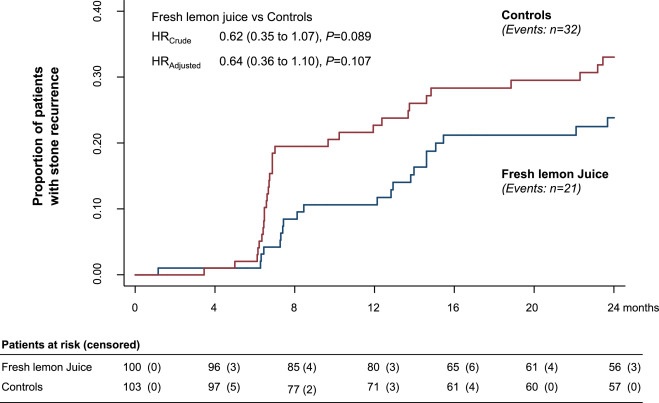Fresh Lemon Juice Supplement for the Prevention of Recurrent Stones in Calcium Oxalate Nephrolithiasis: A Pragmatic, Prospective, Randomized, Open-Blind, and Blind Trial (PROBE)
Background
Standard diet with normal calcium content and reduced animal protein and salt reduces stone recurrence in calcium oxalate nephrolithiasis. It is unknown whether lemon juice supplementation further reduces the recurrence rate.
Methods
In this single-center, prospective, randomized, open-blind trial (Clinical Trials gov NCT01217372), the effects of supplementation with fresh lemon juice (60 mL twice daily) versus no supplementation on time to recurrence were evaluated. of stones in 203 patients with recurrent idiopathic calcium oxalate nephrolithiasis who were prescribed a standard diet.
The patients were included between July 2009 and March 2017 in the Nephrology Unit of the Papa Giovanni XXIII hospital in Bergamo, Italy. Time to stone recurrence at 2 years of follow-up was the primary outcome. Analyzes were intention-to-treat.
Results
During two years of follow-up, 21 of 100 patients randomized to lemon juice supplementation and 32 of 103 controls randomized to no supplementation had stone recurrence [HR (95% CI) : 0-62 (0-35-1-07), p = 0-089]. However, patients’ adherence to lemon juice supplements progressively decreased from 68% at one year to 48% at two years of follow-up.
In exploratory analyzes restricted to one year of follow-up, ten supplemented patients versus 22 controls had stone recurrence [0-43 (0-20-0-89), p = 0-028].
After adjustment for age, sex, and normo- or hypocitraturia, the HR (95%) remained significant [0-45 (0-20-0-93), p = 0-036].
At six months, 24-hour urinary sodium excretion decreased by 8-60±65-68 mEq/24 h in patients receiving lemon juice supplements and increased by 388±64-78 mEq/24 h in those receiving lemon juice supplements. controls.
The changes differed significantly between groups (p = 0-031). This difference was later lost.
The treatment was safe. In patients with lemon juice supplementation, gastrointestinal disorders were more frequent (p<0-001). Renal and urinary tract disorders were similar between groups (p = 0-103).

Kaplan-Meier curves for the primary endpoint of stone recurrence during two years of follow-up. Kaplan-Meier curves show the proportion of patients in the fresh lemon juice supplement group and the control group who met the primary endpoint of stone recurrence over two years of follow-up. Hazard ratios (HR) and 95% confidence intervals are crude and adjusted for age, sex, and citraturia stratum. The number of patients at risk is shown in the table below. Blue line, fresh lemon juice supplementation group; red line, control group.
Interpretation
Exploratory analyzes suggest that supplementation with fresh lemon juice to the standard diet could prevent stone recurrence in patients with calcium-oxalate nephrolithiasis. However, it is likely that the treatment effect is reduced by progressively decreasing adherence to lemon juice supplementation.
Research in context
Evidence prior to this study
PubMed was searched for all English-language articles published between January 1, 1990 and June 30, 2021, using the search terms “calcium oxalate,” “nephrolithiasis,” “stone,” “recurrence,” “citraturia.” , "lemon juice", "randomised controlled trial" and no controlled study could be detected that evaluated the role of lemon juice supplementation in the long-term prevention of recurrent nephrolithiasis.
A few studies suggested that lemon juice may reduce the risk of stone recurrence, but the results seemed to be flawed by the retrospective, observational design and the small sample size that limited the power of the statistical analyses.
Therefore, we conducted a prospective, open-blind, phase III trial (PROBE) to evaluate the effects of fresh lemon juice supplementation, compared with no supplementation, on the long-term risk of stone recurrence in patients. with recurrent idiopathic calcium oxalate nephrolithiasis who were prescribed a diet based on restricted intake of animal proteins and salt, combined with a normal intake of calcium (standard diet).
Added value of this study
The results of the present study showed that the recommended standard diet integrated with 60 mL twice daily of fresh lemon juice and a standard diet without lemon juice supplementation are equally effective in reducing the risk of recurrent stones in patients with oxalate nephrolithiasis. calcic.
It is very likely that the results are biased by the progressive decrease in patients’ adherence to the recommended lemon juice supplements during the two-year follow-up period. In fact, when follow-up was closed one year after randomization, when adherence was still well above 50%, it was observed that the standard diet with lemon juice supplements was more protective against stone recurrence than the standard diet without supplements.
Implications of all available evidence
Fresh lemon juice supplemented with the standard diet appeared to exert some protective effect against stone recurrence in patients with calcium oxalate nephrolithiasis. However, the effect of the treatment was largely mitigated by the progressive decrease in patient adherence and only became evident in the closed post-hoc exploratory analyzes at one year of follow-up, when patient adherence was still acceptable. .
Thus, our findings are not strong enough to recommend oral juice supplementation in daily clinical practice, but they do provide useful information to inspire more effective strategies to improve patient adherence in future trials designed to test the hypothesis. that oral juice supplementation could decrease the risk of stone recurrence in patients with calcium oxalate nephrolithiasis.
In conclusion , in patients with calcium oxalate nephrolithiasis, fresh lemon juice supplemented with a standard diet with a normal calcium content but with reduced amounts of sodium and animal proteins seemed to exert some protective effect against stone recurrence compared to the same standard diet but without lemon juice supplement. However, the effect of the treatment was largely mitigated by the progressive decrease in patient adherence during the study period and only appeared in the post-hoc exploratory analyzes restricted to the first year of follow-up. Therefore, our findings are not strong enough to recommend oral juice supplementation in daily clinical practice, but they provide novel and useful information to inspire more effective strategies to improve patient adherence in future trials aimed at test the hypothesis that oral juice supplementation could decrease the risk of stone recurrence in patients with calcium oxalate nephrolithiasis. |















